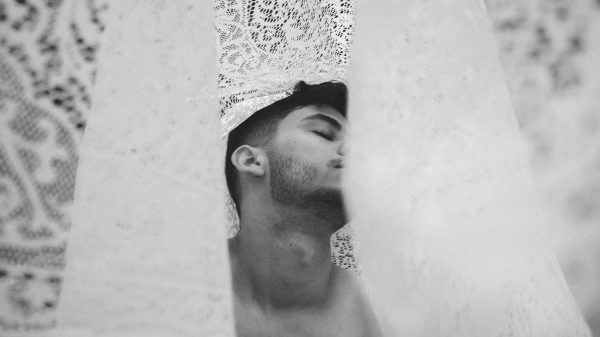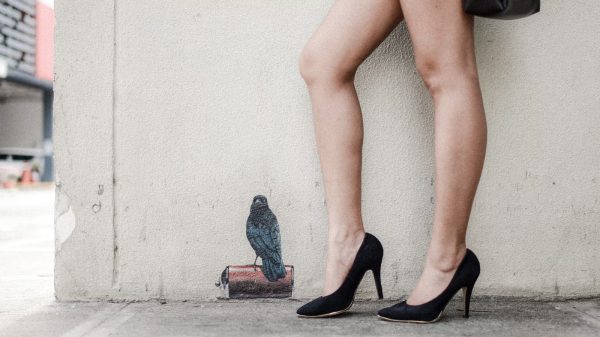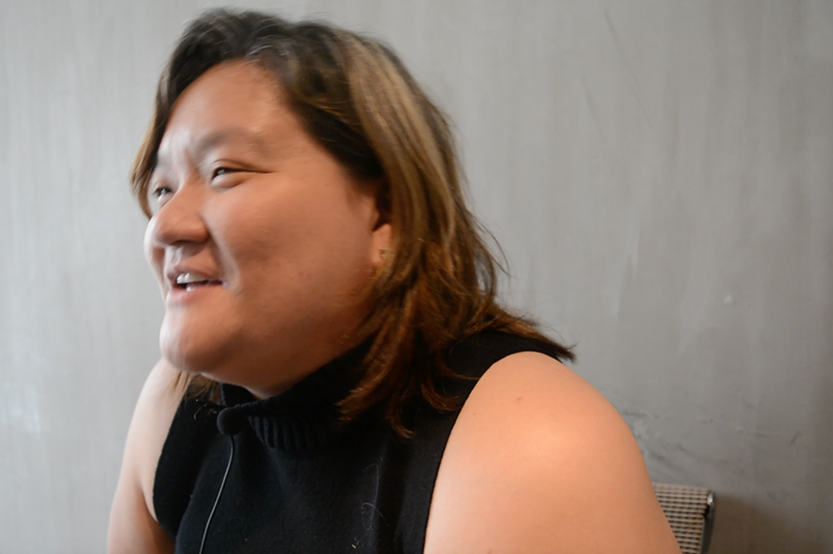This is part of #KaraniwangLGBTQIA, which Outrage Magazine officially launched on July 26, 2015 to offer vignettes of LGBT people/living, particularly in the Philippines, to give so-called “everyday people” – in this case, the common LGBTQIA people – that chance to share their stories.
As Outrage Magazine editor Michael David C. Tan says: “All our stories are valid – not just the stories of the ‘big shots’. And it’s high time we start telling all our stories.”
Assigned male at birth, Ruffy Yulo, 42 from Ortigas/Pasig City, was already 29 when she discovered “I’m actually intersex.”
She recalled though that, earlier, “when I was 19, when I went to the doctor, I would always get checked. The doctor would always say I have hormonal imbalance.”
But one day, when she was 29, she met a doctor in a gathering for gay and bi men. “The first time he saw me, he asked me what I was doing in that gathering.”
The doctor then mentioned to Ruffy that she may be/is intersex; and “it was the first time I heard of such a condition,” considering her sex assignment at birth.
In hindsight, though, there were “clues” in her life on her condition.
“My family actually hid it. But I don’t think it was their intention to keep it from me. I think they were also scared that society won’t understand (my situation),” she said. But she recalled that “one time, we went to the pediatrician who looked after me. I heard him say: ‘Did I not tell you in the past to fix this?’.”
And so when she was told she’s intersex, “I thought I’d just do the test (karyotyping). If I see from the test that I’m not intersex, that’s okay.”
But when Ryffy took the test, “I found out that I was actually a mosaic, I was really surprised. I was happy, but at the same time, I was also very confused.”

LIFE LIVED HARD
There was a time when Ruffu met someone who’s intersex. “That time, I thought, their case is very complicated. But their situation also made it easy for them… like explaining to those who’d mock them. I was young then; and that’s what I thought – that it was easier for them.”
But after finding out she, herself, is intersex, “it turns out I was wrong. When I found out (I’m intersex), that was when I realized how difficult it is to be intersex.”
For example, as an adolescent, “when my body started changing, I had difficulty going to the toilet. When I go to the male toilet, I would get questioned: ‘Ma’am, this is the male toilet; yours is on the other side.’ There came a point when I wouldn’t even go to a toilet anymore. I’d just contain myself, and use a toilet when I’m in a place with (gender-neutral facilities).”
And when she applies for a job, “I always get to the second interview. But when I undergo medical exams, I never get any more calls.”
Ruffy said: “There was a point in time when I felt I was alone. I felt like there was no one to talk to. It’s like even if you’re talking to a loved one, they don’t really understand you. It’s like speaking in a foreign language with them.”
BODY AUTONOMY
For most people who know Ruffy, “from the time we were classmates to the present time, they all consider me as gay. So even if I explain my situation as an intersex person, they will not understand. In fact, I tried several times,” she said.
There were times when people gossiped about her in school, for instance.
“When we were supposed to have a reunion, I was not able to attend. There were rumours that I (had gender affirmation surgery as a trans woman). That I had surgery because I just wanted to sleep around. Those were the stories that went around. But the truth was, I was already at risk for testicular cancer. That was the main reason why I had myself checked.”
The doctor who can do the surgery Ruffy needed here in the Philippines only had around 70 cases. “Unlike in Thailand, when I went there, I met my doctor and he already did over a thousand cases. In those 1,000 cases, he did (surgery) on two intersex individuals already. So I felt a lot safer (with him).”
It was a costly procedure, Ruffy admitted.
“But, you know, at that time when I did this, I didn’t have a choice. I was already at risk of having testicular cancer. And things needed to be removed. I also told my parents then that since there are many issues with my body, I wanted to fix everything in one go. At that time I was at risk to get testicular cancer, I had hernia… and there was that issue with my being intersex,” she said.
After her surgery, when Ruffy returned to the Philippines, she bled. “So I rushed myself to the hospital. There, while the doctor was checking me, I was surprised when nurses started gathering around me. They left their patients. They were all there trying to ask me several questions. I felt that the questions were irrelevant. They asked: How do you do sex? Why do you think you bled? Did you insert something inside you? Some of them I found really offensive,” Ruffy recalled. “But at that time, I had very little choice but to answer them. I thought, too, that maybe it’s for my own benefit.”

In hindsight, Ruffy said that “there (isn’t a lot of study done about the intersex condition). In fact, when I was talking to a physician, he told me that when they were still in medical school, there’s only one chapter covering this topic. What they know is so limited, so that every time they encounter an intersex person, they tend to ask a lot because it’s their only chance to get answers.”
To Ruffy, though – and she stresses this – if intersex people think that getting (non-necessary) surgery is the answer, “the solution for them to be happy, let me say this isn’t the solution. In fact I discourage intersex individuals to undergo surgery. To start, it’s costly. Secondly, it’s hard. Take my case, for instance, after undergoing the procedure, there were complications. One of the complications for me was… like I had early menopause. So the tendency was… for my bones to be more brittle.”
ON FINDING LOVE
“We know that a lot of men want someone who’s ‘normal’. They want someone who can conceive. They want someone they can grow old with… while caring for their grandchildren. This is something I can’t give,” Ruffy said.
So for a time, she didn’t date. “I mean, I also tried dating. But it’s challenging; it doesn’t work out. From the very start, even before we go on a date, I already tell them (that I am intersex).”
The doctor told her not to immediately disclose. “There was an instance after the surgery – when the doctor told me not to immediately disclose – when not disclosing gave me more problems. The guy thought I lied to him. Even if, in fact, that was not the intention.”
FINDING THE COURAGE
To younger intersex people, Ruffu said that “it’s totally normal to be scared. I will not say that you will instantly be courageous. But if you are facing hardships, these challenges are not exclusive to intersex people. Bisexuals, gays, lesbians and (even) heterosexuals – people from all spectrum, we all encounter difficulties. Perhaps it’s just more complicated for intersex people.
“But, you know, don’t limit your way of thinking that you’d amount to nothing. In fact, there are more chances to improve.”

That there will always be people who will look down on (or at least look differently at) intersex people does not escape Ruffy.
“What I learned over time is that it is the people who discriminate who have problems. They may be afraid that what other people experience, it will also be done to them. For instance, a person may say another person is not capable. It may be because that person is the one who is not capable. They are only projecting to others their lack of capability,” she said. “The truth is, if we give others a chance, there’s more to everyone (than meets the eye).”
The founder of Outrage Magazine, Michael David dela Cruz Tan completed BA Communication Studies from University of Newcastle in NSW, Australia; and Master of Development Communication from the University of the Philippines-Open University. He grew up in Mindanao (particularly Kidapawan and Cotabato City), but he "really came out in Sydney" so that "I sort of know what it's like to be gay in a developing, and a developed world". Conversant in Filipino Sign Language, Mick can: photograph, do artworks with mixed media, write (DUH!), shoot flicks, community organize, facilitate, lecture, and research (with pioneering studies under his belt). He authored "Being LGBT in Asia: Philippines Country Report", and "Red Lives" that creatively retells stories from the local HIV community. Among others, Mick received the Catholic Mass Media Awards in 2006 for Best Investigative Journalism, and Art that Matters - Literature from Amnesty Int'l Philippines in 2020. Cross his path is the dare (guarantee: It won't be boring).

































































